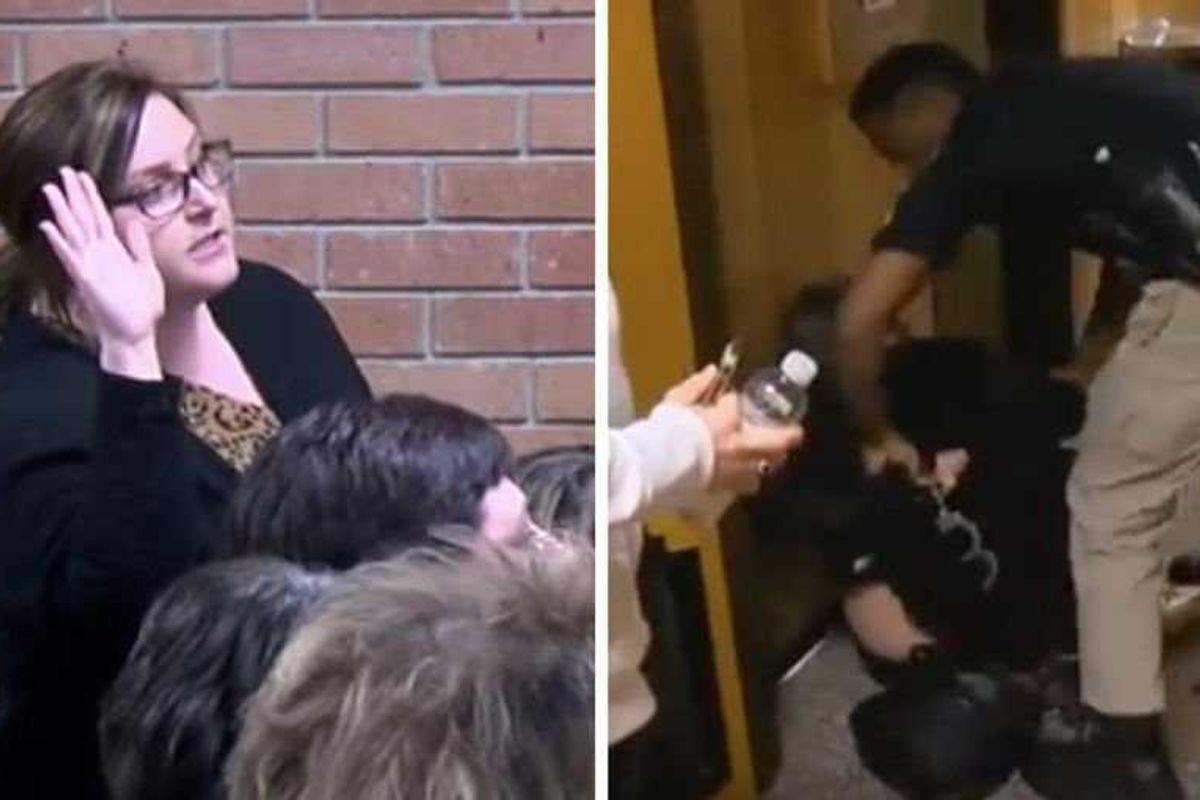A teacher asked an important question about superintendent's pay raise. Then she got arrested.
She was handcuffed and thrown in jail.
Deyshia Hargrave speaking at a school board meeting, being arrested.
We all know teachers have one of the hardest jobs in America: Educating our country's children while often working without enough resources, institutional support, or even a livable salary. But a story from 2018, showcases one of the most egregious examples of unfair pay in the public school system. But we promise it has a happy ending.
Why should a superintendent get a raise while teachers in the same district struggling to make ends meet see their paychecks flatline — year after year after year?
Teacher Deyshia Hargrave begged the question. Minutes later, she was handcuffed and placed in the backseat of a cop car. The scene was captured below by YouTube user Chris Rosa, who attended a Vermilion Parish Schools board meeting in Louisiana. You can watch Hargrave begin speaking about 33 seconds in. The situation starts becoming contentious around 6:35 minutes. Hargrave was arrested at 8:35 and then walked outside in handcuffs and was placed in the back of a police vehicle.
- YouTube www.youtube.com
Hargrave was questioning the school board about how they can vote to give the superintendent a raise when school employees have not gotten a raise.
"We work very hard with very little to maintain the salaries that we have," Hargrave, who teaches middle school language arts, said during a public comment portion of the meeting, stating that she's seen classroom sizes balloon during her time at the school with no increased compensation. "We're meeting those goals, while someone in that position of leadership [the superintendent] is getting raise? It's a sad, sad day to be a teacher in Vermilion Parish."
According to comments Hargrave made to BuzzFeed News, she believes Superintendent Jerome Puyau was already making $110,000 before the board voted to give him a raise of $38,000. The raise alone is roughly the salary of "a teacher, or two cafeteria workers, or two janitors," Hargrave told the outlet.
After Hargrave spoke out again later in the meeting, a city marshal on duty asked her to leave — even though the school board was still addressing her.
"You're going to leave, or I'm going to remove you," the officer told her, as seen in the video. Many people in attendance seemed shocked. "Are you serious?" someone asked, aghast, in the crowd.
Hargrave leaves the room, followed by the officer. But moments later, someone chimed in, "he's putting her in handcuffs" — and the room erupts in disarray.
"I am not [resisting], you just pushed me to the floor!" Hargrave is heard screaming at the officer, as he forcibly removes her down the hallway and out the building in handcuffs. "Sir, hold on! I am way smaller than you!"
- YouTube www.youtube.com
According to KATV News, Hargrave was booked in the city jail for resisting an officer — a fact that left many commenters online flabbergasted. School officials are reportedly not pressing charges. "Umm ... what charges could they possibly make?" one Redditor noted.
With help from the Reddit community, Rosa's video has gone viral, garnering more than 600,000 views in less than 24 hours. Clearly, Hargrave's earnest question about inequality in our education system — met with a grotesque abuse of power — has clearly touched a nerve with people across the country.
"I don't know how this teacher could have been more polite and patient in her earnest desire to find out why the superintendent deserves a raise while the teachers work harder with less," YouTube commenter Scott Wells chimed in. "She continued to press because they refused to come up with an answer. Seems like a good question to me."
We agree.
After the incident, Hargrave suffered bruising, pain, mental anguish, and had expenses for therapy and the cost of being released from jail. The case came to the attention of the ACLU of Louisiana, which became involved. "This incident was a clear violation of Deyshia Hargrave's constitutional rights for which the officials and officer responsible should absolutely be held accountable," Executive Director Alanah Odoms HebertHebert said in a statement.
Impressive turnout for #standbydeyshia rally. Deyshia Hargrave is the Vermilion MS teacher arrested during a school board meeting. pic.twitter.com/ggtCxPWU7R
— Katherine Mozzone (@MozzoneReports) January 11, 2018
Things didn't go well for the superintendent
Thankfully, Hargrave's efforts were not in vain. The incident went viral, drawing national attention from several media outlets, including Upworthy, which pointed out the injustice of blocking educators like Hargrave from having a place to speak in opposition to the pay raises. Later in 2018, a Lafayette court invalidated the superintendent's contract, according to The Daily Advertiser. A state appeals court backed the decision.
The Advertiser reports that in 2019, Hargrave filed a lawsuit over her arrest. Later that year, the Vermilion Parish School Board voted to remove Payou from his role, according to KATC. Later that year, Payou agreed to resign from his position, and a settlement was reached over the initial case surrounding his pay raise. He is now retired.
This article originally appeared six years ago. It has been updated.

